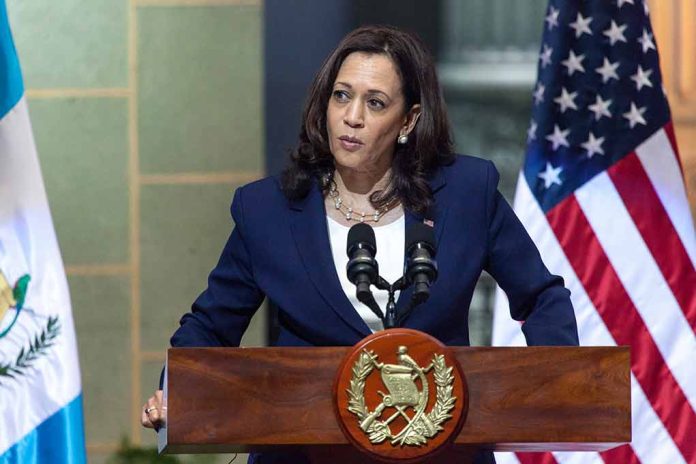
Vice President Kamala Harris’ presidential campaign faced criticism for extravagant spending on celebrity endorsements and luxury travel, despite her emphasis on climate change and progressive causes.
At a Glance
- Harris’ campaign spent $3.8 million on private jets in less than six weeks, contradicting her climate change stance.
- The campaign raised $633 million between July and September 2024, outpacing Donald Trump’s fundraising.
- Expenditures include a $1 million payment to Oprah’s company and six-figure spending on podcast appearances.
- Critics label Harris’ actions as hypocritical, citing high carbon emissions from private jet travel.
- The campaign ended up $20 million in debt despite raising $1 billion.
Luxury Spending Contradicts Climate Change Stance
Vice President Kamala Harris’ presidential campaign has come under fire for its lavish spending on private jet travel, totaling at least $3.8 million in less than six weeks. This expenditure stands in stark contrast to Harris’ public statements on climate change, which she has repeatedly called an “existential threat.” The campaign’s reliance on private aviation, known for its high carbon emissions, has led to accusations of hypocrisy.
The National Library of Medicine reports that private aviation is the most energy-intensive form of air travel, consuming significantly more fuel per passenger compared to commercial flights. This fact has not gone unnoticed by critics who question the sincerity of Harris’ environmental commitments.
Record-Breaking Fundraising and High-Profile Donors
Despite controversy over her campaign’s spending, Kamala Harris has shown a notable ability to attract big-dollar donations. Between July and September 2024, her campaign raised an eye-popping $633 million—surpassing Donald Trump’s fundraising by $488 million. However, this massive haul has relied heavily on contributions from elite, high-profile donors such as Hollywood agent Ari Emanuel, crypto billionaire Tim Draper, and wealthy philanthropists Melinda French Gates and Laurene Powell Jobs.
For many conservative Americans, this reliance on Hollywood elites and billionaires raises concerns about Harris’ true priorities and whether her campaign genuinely represents ordinary Americans. By depending on such large contributions from a wealthy few, Harris alienated everyday voters, who may wonder if she’s really in touch with the needs and values of the average American family.
Indeed, while Donald Trump’s victory underscored his connection with a broad base of conservative supporters, his campaign also benefited from high-profile allies like Elon Musk.
Musk’s support, both direct and indirect, played a substantial role in amplifying Trump’s message across digital platforms, appealing to both grassroots supporters and wealthier conservative donors. However, unlike Harris, Trump’s campaign managed to position this support as aligning with his agenda for economic and technological growth, which resonated with his base as a vision of American self-reliance and innovation. For many conservative Americans, this strategic alliance with Musk was seen less as elite pandering and more as a partnership aimed at national advancement.
Controversial Expenditures and Celebrity Endorsements
Federal Election Commission filings have revealed a pattern of extravagant spending by the Harris campaign. A standout expense was a $1 million disbursement to Oprah Winfrey’s production company, raising eyebrows about the allocation of campaign funds. Additionally, the campaign invested heavily in celebrity endorsements and appearances, including a six-figure expenditure for Harris’ appearance on the podcast “Call Her Daddy.”
These spending decisions have led to significant criticism, with some questioning the strategic value of such investments. The campaign’s approach to mingling media figures with politics has been widely scrutinized, particularly in light of its substantial debt.
Campaign Debt and Financial Concerns
Despite raising over $1 billion, the Harris campaign reportedly finished $20 million in debt. This financial situation has raised concerns about the campaign’s management and spending priorities. Critics argue that the focus on luxury travel, celebrity endorsements, and high-profile events may have come at the expense of more practical campaign strategies.
“Donors hate this shit when they’re going around making representations that she’s in a competitive race, and she’s spending that way to support her diva lifestyle,” a Democratic strategist familiar with the campaign said.
The campaign’s financial decisions not only impacted its bottom line but also appeared to damage Kamala Harris’ reputation among donors and supporters. Now, with the race concluded and Donald Trump victorious, it’s evident that Harris struggled to balance her campaign’s financial needs with public concerns about her spending habits and her commitment to the causes she promoted. This mismanagement may have contributed to a perception of disconnect, leaving some donors and supporters questioning her priorities and effectiveness in the campaign.












